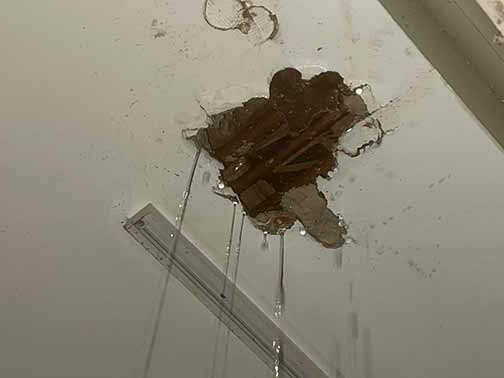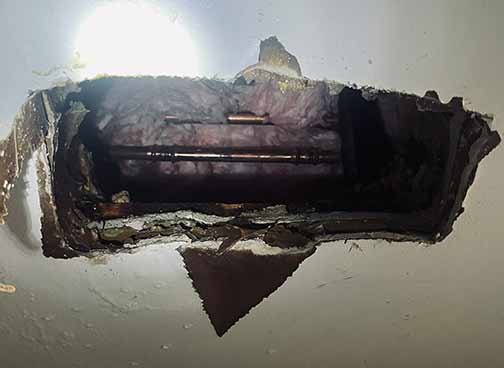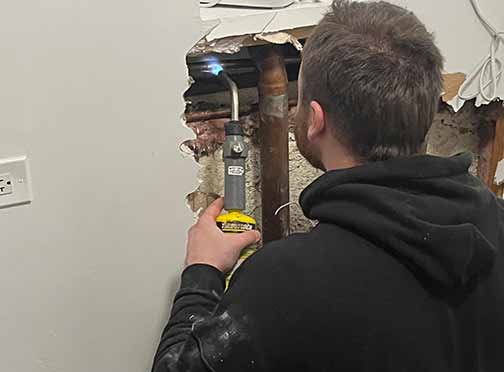
Burst pipes are a common plumbing emergency that can cause significant damage to your home. Understanding the causes of burst pipes is crucial in preventing such incidents. The primary reasons for burst pipes include freezing temperatures, high water pressure, corrosion, and physical damage.
During winter, water in pipes can freeze and expand, causing the pipes to burst. High water pressure can also stress pipes, leading to ruptures. Corrosion weakens pipes over time, making them susceptible to bursting. Additionally, physical damage from construction or accidental impacts can result in burst pipes.
Immediate Actions to Take When a Pipe Bursts
When faced with a burst pipe, quick action is essential to minimize damage. The first step is to turn off the main water supply to prevent further flooding. Locate the main water valve and shut it off immediately. Next, open all faucets to drain the remaining water from the pipes. This helps relieve pressure and reduce the amount of water that escapes from the burst pipe.
If the burst pipe is near electrical outlets or appliances, turn off the electricity to avoid the risk of electrocution. Lastly, call an emergency plumber to assess and repair the damage.
Preventing Water Damage
Preventing water damage is a critical aspect of managing burst pipes. Once the immediate steps are taken, it’s important to remove any standing water to prevent further damage to your property. Use mops, towels, or a wet/dry vacuum to soak up the water.
Move furniture, rugs, and other belongings to a dry area to prevent water damage. If the affected area is large, consider using fans and dehumidifiers to speed up the drying process. Document the damage with photos for insurance purposes and contact your insurance company to report the incident.
Long-Term Solutions to Prevent Burst Pipes
Implementing long-term solutions can help prevent burst pipes and protect your home from future plumbing emergencies. Insulating your pipes is one of the most effective ways to prevent them from freezing during cold weather. Use pipe insulation or heat tape to keep pipes warm.
Regularly check for signs of corrosion and replace old or damaged pipes to prevent ruptures. Installing a pressure regulator can help maintain safe water pressure levels and reduce the risk of burst pipes. Additionally, consider installing a leak detection system that alerts you to potential leaks before they become major issues.
Understanding the Role of an Emergency Plumber
An emergency plumber plays a vital role in managing burst pipes and other plumbing emergencies. These professionals are available 24/7 to respond to urgent plumbing issues. They have the expertise and tools to quickly diagnose and repair burst pipes, minimizing damage to your property.
Emergency plumbers can also provide valuable advice on preventing future plumbing problems. When choosing an emergency plumber, look for licensed and insured professionals with a good reputation in your area. Having a reliable emergency plumber on speed dial can give you peace of mind in case of a plumbing emergency.
Assessing and Repairing Damage
Assessing and repairing damage caused by burst pipes is a crucial step in the recovery process. Once the plumber arrives, they will inspect the affected area to determine the extent of the damage. This includes checking for structural damage, mold growth, and other potential issues. The plumber will then repair or replace the burst pipe and any damaged fittings.
In some cases, it may be necessary to cut into walls or floors to access the damaged pipe. After the repairs are completed, it’s important to thoroughly dry the affected area to prevent mold and mildew growth.

Restoring Your Home After a Burst Pipe Incident
Restoring your home after a burst pipe incident involves more than just repairing the damaged pipe. It’s essential to address any water damage to your property to prevent long-term issues. This may include replacing damaged drywall, flooring, and insulation. If mold is present, professional mold remediation services may be necessary to ensure your home is safe and healthy.
Additionally, it’s important to take steps to prevent future plumbing emergencies, such as regular maintenance and inspections of your plumbing system. By addressing both the immediate and long-term impacts of a burst pipe, you can restore your home to its original condition and prevent future incidents.
Insurance and Financial Considerations
Dealing with the financial impact of a burst pipe can be challenging. It’s important to understand your insurance coverage and file a claim as soon as possible. Most homeowners’ insurance policies cover water damage caused by burst pipes, but it’s essential to review your policy and understand the specific terms and conditions.
Document the damage with photos and keep receipts for any repairs or replacements. Contact your insurance company to report the incident and provide the necessary documentation. In some cases, you may need to hire a public adjuster to help negotiate your claim and ensure you receive fair compensation.
Educating Your Family on Emergency Procedures
Educating your family on emergency procedures can help ensure a quick and effective response to a burst pipe incident. Make sure everyone in your household knows how to locate and shut off the main water valve. Create an emergency plan that outlines the steps to take in case of a plumbing emergency, including contacting an emergency plumber and moving valuable items to a safe location.
Conduct regular drills to practice your emergency plan and ensure everyone is familiar with the procedures. By educating your family and preparing for potential emergencies, you can minimize damage and ensure a swift response to burst pipes.
Choosing the Right Plumbing Materials
Choosing the right plumbing materials can significantly reduce the risk of burst pipes. When installing or replacing pipes, consider using materials that are durable and resistant to corrosion, such as copper or PEX (cross-linked polyethylene). These materials are less likely to burst under pressure and can withstand extreme temperatures.
Additionally, ensure that all fittings and connections are properly installed and sealed to prevent leaks. Consult with a professional plumber to determine the best materials for your specific plumbing needs and ensure a reliable and long-lasting plumbing system.
Regular Maintenance and Inspections
Regular maintenance and inspections are essential to preventing burst pipes and other plumbing emergencies. Schedule annual inspections with a licensed plumber to check for signs of wear and tear, corrosion, and potential leaks. During these inspections, the plumber can identify and address any issues before they become major problems.
Additionally, perform routine maintenance tasks such as cleaning drains, checking for leaks, and insulating pipes. By staying proactive and addressing potential issues early, you can extend the lifespan of your plumbing system and prevent costly emergencies.
Understanding the Impact of Climate on Plumbing
The climate in your area can have a significant impact on your plumbing system. In regions with cold winters, pipes are more susceptible to freezing and bursting. In areas with high humidity, pipes may be more prone to corrosion and mold growth. Understanding the specific challenges posed by your local climate can help you take appropriate measures to protect your plumbing system.
For example, in cold climates, insulating pipes and keeping indoor temperatures above freezing can prevent burst pipes. In humid areas, using dehumidifiers and ensuring proper ventilation can reduce the risk of corrosion and mold. By considering the impact of climate on your plumbing, you can take proactive steps to prevent burst pipes and other issues.

The Importance of Professional Plumbing Services
Professional plumbing services are essential for maintaining a reliable and efficient plumbing system. Licensed plumbers have the expertise and tools to handle a wide range of plumbing issues, from routine maintenance to emergency repairs. They can provide valuable advice on preventing burst pipes and other common problems.
Additionally, professional plumbers can ensure that all work is done to code and meets industry standards, reducing the risk of future issues. When choosing a plumber, look for licensed and insured professionals with a good reputation and positive reviews. Investing in professional plumbing services can save you time, money, and stress in the long run.
Conclusion: Proactive Measures for Plumbing Emergencies
Managing burst pipes and other plumbing emergencies requires a combination of immediate actions, long-term solutions, and professional assistance. By understanding the causes of burst pipes and taking proactive measures to prevent them, you can protect your home from significant damage. Educating your family on emergency procedures, choosing the right plumbing materials, and investing in regular maintenance and inspections are all crucial steps in ensuring a reliable plumbing system.
In the event of a plumbing emergency, having a trusted emergency plumber on speed dial can make all the difference. By staying prepared and proactive, you can effectively manage plumbing emergencies and maintain a safe and comfortable home.

